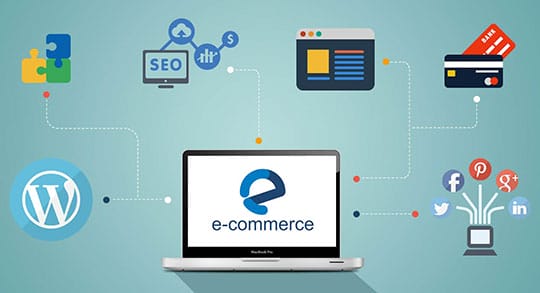WordPress is one of the most powerful CMS currently available in the market. It has maintained a reputation for being famous among almost 25% of all the webmasters in the world. But now with the arrival of more eCommerce platforms that are specifically made for eCommerce sellers. WordPress is struggling with hefty competition, though it has the WooCommerce plugin to add functionality and eCommerce power.
Still, there are people having second thoughts when someone recommends a solution of enhancing their WordPress Website into an eCommerce one. To remove these second thoughts and help you get your decision straight, here are some facts about WordPress being an eCommerce powerhouse.
WordPress is SEO friendly and easy to market

Most WordPress webmasters worry about the ranking of the website when opting for a new eCommerce website. For sure when there is a revamp or switch in the website’s interface the ranking takes a tumble. This can make the sales, and performance of the website dive into a dip until the website is re-optimized and gets the deserved recognition.
If you already have a WordPress website and you just want to add the eCommerce features to it. The best option is to adapt the WooCommerce plugins and optimize the products with them. WooCommerce will not only give you added functionality but will also help you retain your current rankings in the SERPs. Also since WordPress websites are so SEO friendly, new pages being made won’t bother you much when ranking for the favorite keywords.
Usually, there are KPIs to make the website optimized for the search engines. But in WordPress, you can automate the SEO KPIs by using plugins like Yoast and Rank Math. These plugins and their alike ensure the proper optimization of each page on your WordPress website.
Recommended for you: WordPress Speed Optimization: How to Accelerate your WordPress Website in 2022?
Using the WooCommerce plugin to add eCommerce functionalities

Since WordPress is not an eCommerce platform it has to adapt the eCommerce functionalities using plugins. Fortunately, WordPress itself has made a platform called WooCommerce. WooCommerce is a plugin that enables the WordPress website to handle eCommerce operations. The good thing for WordPress webmasters is that WooCommerce and its plugins are more economical as compared to switching to a new eCommerce platform.
The functionalities that WooCommerce adds to an eCommerce WordPress website are:
User-centric storefronts:

One might think that if building a storefront on a CMS that was not built for eCommerce purposes, the users won’t find them the ideal eCommerce environment. But that’s not the case in WooCommerce plugins’ useability. They make just the right kind of eCommerce store for the users, that is easy to navigate and functions without any laybacks.
Product optimizations for SEO:

Product optimization is one of the most essential parts of the eCommerce website. If the product does not search engine optimized there are very rare chances of it appearing to customers organically. WooCommerce enables you to optimize the product descriptions and other metrics that matter for SEO optimization. In return, you get more organic traffic as compared to the non-optimized product pages.
Product pages customization:

Have you seen those eCommerce pages that give you proper information while showing the original product from every angle? Yes! WooCommerce can do that in your WordPress website. Just add the plugin that you deem favors your goals and voila, you will have the customized product page for yourself.
Diverse payment gateways:

Payment gateways are sometimes a pickle and users abandon the cart if their favorite one is not listed. To deal with this problem WooCommerce gives you a variety of payment gateways that you can choose from. It also provides the cash on delivery or COD feature for those customers who want to pay in cash after their product has been delivered.
Secure eCommerce stores:

eCommerce stores have to be secured if not they will make your customers go away. To ensure this WooCommerce and WordPress both has many kinds of plugins and features that make the website secure for the users. Even the payment gateways have additional security features that one might find useful.
WordPress themes and templates

WordPress being in the websites diaspora for so long has earned a lot of templates that might not be available for other eCommerce websites. Most WordPress themes are lesser in cost and serve the greater purpose of satisfying the users.
At an estimate, WordPress has over 8K themes from which almost 1200 themes are especially focused on the eCommerce aspect of the website. The best thing about these themes is that they are all responsive; you won’t have to worry about the user’s device. They work just fine for both mobile users and desktop users.
You may like: Advantages and Disadvantages of Using WordPress for Your Next PHP Project.
Why do people hesitate from using WordPress for eCommerce?

Well first of all WordPress is not made for the eCommerce niche. It was supposed to be the CMS which it is and serves the goals of a CMS with perfection. It has also served thousands of websites that are being used for several purposes. But people still hesitate to adopt WordPress as an eCommerce platform because the word is that it won’t function as one.
Though there is some truth to it, still with the addition of WooCommerce it’s not any lesser than any eCommerce platform. WordPress also doesn’t go well when there are two plugins using the same resource to generate results. For example, if you are using rank math and Yoast there will be site performance issues. Though this is the issue from the webmaster’s end it affects the performance of the WordPress website and affects the users too.
In terms of security, WordPress provides a fair number of features. But still, there are better options to adapt for making your eCommerce website secure. Since WordPress is older than its competitors there are many hacks and tricks people use to make it vulnerable. Though they can be overcome by using plugins that become a hefty task to do.
Why should people adopt WordPress for eCommerce?

There are several reasons why people should adopt WordPress for eCommerce some of the core reasons are the following ones:
WordPress is easy to use:

WordPress becomes comparatively easier to use when you have been using it as your business website for a few years. At this point, most WordPress users find it more feasible to use WordPress as an eCommerce platform rather than switching to a new platform. Adding in plugins like WooCommerce assists in all kinds of eCommerce operations. If you already have your website optimized and ranking these plugins can boost your eCommerce sales more as compared to the competitors.
WordPress is more customizable than its competitors:

WordPress is known to be one of the best customizable website platforms. Of course, when tested in eCommerce real it has some limitations. But overall looking at the comfort of being able to use most of the eCommerce features using the WooCommerce plugins makes WordPress an amazing platform.
Also, there are thousands of pre-built themes, and you can also make a customized one at relatively cheaper rates. The same goes for the WooCommerce plugins that add the eCommerce functionalities in WordPress. You can choose from the WooCommerce marketplace. Or you can hire a WooCommerce developer to make a tailored one for your WordPress website.
WordPress vs Shopify vs Magento:

Scalability: in terms of scalability WordPress if dealt professionally with a WordPress developer is scalable. Despite the ease that comes with WordPress it still needs an experienced WordPress developer that can enhance its functionalities. On the other hand, Shopify is only scalable with Shopify plus. Magento does its work with scalability just fine, given that you would need a Magento developer from the start.
Check a complete comparison between WooCommerce, Shopify, and Magento here.
Ease Of Use: One thing that WordPress has remained for many years is being easy to use. There have been quite a few competitors, but no one has been able to beat WordPress with ease of use. As compared to WordPress Shopify and Magento are a little difficult as compared to WordPress’s ease of use.
Customer Service: In customer service the services that customers can enjoy vary a little bit for WordPress and Shopify. WordPress users have a forum and Shopify users have 24×7 customer service. As compared to both of them Magento does not get any customer service for the free version. To get customer services you need to upgrade the enterprise plans.
Cost: Cost is the metric in which WordPress rules, and no one can beat it. WordPress and WooCommerce are free. Magento is free for the open-source version at the moment; you can upgrade to the enterprise version, but the rates may vary. For Shopify, the basic plans start from 29$ a month.
You may also like: 10 Types of Websites You Can Build with WordPress.
Conclusion:

To be fair the WordPress is a decent CMS that can be turned into an eCommerce website by using WooCommerce. But is this hefty and there are way better solutions if you want to make a new website. So, make your informed decisions keep all the metrics in check, and then decide the best eCommerce platform for yourself.
This article is written by Usman Khanzada. Usman is a digital marketer at Yazlo having good experience of about 3 years in this field. He is passionate about digital marketing, entrepreneurship, and the web in general. He loves to learn new things related to technology. You can reach him on LinkedIn.





